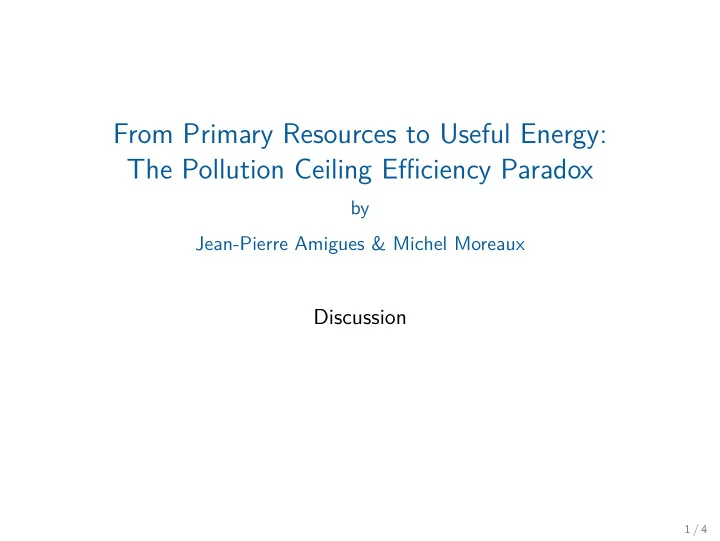

From Primary Resources to Useful Energy: The Pollution Ceiling Efficiency Paradox by Jean-Pierre Amigues & Michel Moreaux Discussion 1 / 4
Paper summary • Hotelling type model with exhaustible (coal) and renewable (solar) energy resources, and a cap on atmospheric carbon • Main feature: Distinguishes between crude and useful energy, conversion from crude energy to useful energy costly • Must decide how much crude energy to extract/produce AND conversion rates between crude and useful energy (but not innovation) 2 / 4
Paper summary • Hotelling type model with exhaustible (coal) and renewable (solar) energy resources, and a cap on atmospheric carbon • Main feature: Distinguishes between crude and useful energy, conversion from crude energy to useful energy costly • Must decide how much crude energy to extract/produce AND conversion rates between crude and useful energy (but not innovation) • Analyzes economy’s transition from polluting non-renewable energy to clean renewable energy – some results: • Crude-useful energy conversion rates (coal and solar) increasing over time • But, conversion rates constant when carbon constraint binds 2 / 4
Questions and comments 1 Crude-to-useful energy conversion rates vs. innovation • How (and why) to think about increasing crude-to-useful conversion rates separately from efficiency-improving innovation? • For example, in steam engine example from introduction, how much of increase in energy efficiency is due to choice of conversion rate rather than innovation? 2 Can we disentangle choice of conversion rate from efficiency-improving innovation? • Interdependencies? • Joint analysis for complete understanding of long-run effects? • F.ex.: Innovation shifts energy conversion cost curve down 3 / 4
Questions and comments 1 Crude-to-useful energy conversion rates vs. innovation • How (and why) to think about increasing crude-to-useful conversion rates separately from efficiency-improving innovation? • For example, in steam engine example from introduction, how much of increase in energy efficiency is due to choice of conversion rate rather than innovation? 2 Can we disentangle choice of conversion rate from efficiency-improving innovation? • Interdependencies? • Joint analysis for complete understanding of long-run effects? • F.ex.: Innovation shifts energy conversion cost curve down 3 The efficiency paradox • Elaborate more on the efficiency paradox mentioned in the title • Currently not explicitly mentioned in paper, but should perhaps be? 3 / 4
Questions and comments 4 Renewable energy conversion rate • Model’s solar conversion rate captures both scale of solar energy production (e.g. solar PV covered area) and efficiency of technology used (¯ y given) • Implications for energy conversion cost and transition to solar? 4 / 4
Questions and comments 4 Renewable energy conversion rate • Model’s solar conversion rate captures both scale of solar energy production (e.g. solar PV covered area) and efficiency of technology used (¯ y given) • Implications for energy conversion cost and transition to solar? 5 No production capital stocks or investment (coal/solar plants) • Implies that adjustments in both production and conversion rates can be made immediately • What if energy conversion rates for power plants are determined at time of investment (tech lock-in)? 4 / 4
Questions and comments 4 Renewable energy conversion rate • Model’s solar conversion rate captures both scale of solar energy production (e.g. solar PV covered area) and efficiency of technology used (¯ y given) • Implications for energy conversion cost and transition to solar? 5 No production capital stocks or investment (coal/solar plants) • Implies that adjustments in both production and conversion rates can be made immediately • What if energy conversion rates for power plants are determined at time of investment (tech lock-in)? 6 Empirical relevance and policy implications • Analysis focuses on social planner case with global carbon cap • Implications for other (perhaps more realistic) policy scenarios? • What should policy makers do given your results? 4 / 4
Recommend
More recommend